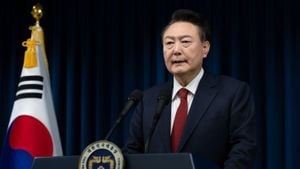A local council in London has once again denied China’s proposal to construct what’s been dubbed as its "super-embassy." This rejection, voiced by Tower Hamlets Borough Council, primarily stemmed from concerns about potential threats to community safety and the burden on law enforcement. Observers meanwhile worry the British government might step in to override this local decision soon, sparking fresh debates about the balance of power between local authorities and national interests.
After having been turned down back in 2022, China submitted its application to develop the extensive site close to Westminster once more. This area, which includes heritage buildings previously owned by the Royal Mint and has been under Chinese government control for about six years, is only about three miles from the heart of British democracy. The council’s recent decision to disallow the construction cited explicit reservations about the potential impact on public safety, police resources, and the preservation of local heritage.
A spokesperson for the council described how the committee unanimously ruled against the application, citing substantial fears expressed by residents and officials alike about the safety of both locals and tourists. They noted the project’s “impact on resident and tourist safety, heritage, police resources, and highway safety” as significant concerns due to the busy nature of the district.
Interestingly, the ultimate decision on this super-embassy may not rest solely with local officials. Angela Rayner, the Secretary of State for Housing, Communities and Local Government, will hold the final say, having previously pointed to the issue's "national significance" back on October 14. This raises questions about the influence of national security interests on local governance.
China has reacted with veiled threats indicating it may reconsider the British government's proposed renovation of its embassy back home as retaliation for the rejection of the super-embassy. This tit-for-tat dynamic adds layers to the discourse surrounding foreign diplomatic facilities and their potential as points of contention, especially when intertwined with security dilemmas.
London’s Metropolitan Police underscored the heavy toll this embassy could take on policing resources. The Deputy Assistant Commissioner of Special Operations warned the planning committee about how maintaining safety during potential demonstrations at such a site would harm the ability of officers to perform their duties, resulting in likely disruptions for local communities and businesses. With protests increasingly commonplace around political embassies, the police anticipated needing to divert resources away from frontline duties just to manage public order around this proposed facility.
Activists and rights organizations have urged the UK government to not yield to what they deem pressure from Beijing, bolstering claims the super-embassy could become a nucleus for espionage targeting dissident groups such as Tibetans and Hong Kong activists. These groups fear the establishment will act as more than just a diplomatic hub, positing it could serve as headquarters for oppressive operations on British soil.
The organization Free Tibet highlighted this apprehension, insisting the UK government must heed the strong rejection by the council. Echoing these sentiments, the Hong Kong Democracy Council implored Rayner to stand by the council’s unanimous decision, emphasizing the gravity of local opposition to the proposal.
Meanwhile, this proposed facility has also stirred unease due to its potential to represent China’s authoritarian tendencies abroad. Campaigners voiced how it could potentially widen the net of surveillance over Chinese dissidents and hamper democratic freedoms within the UK. Past allegations against the Chinese government’s overseas infiltration tactics have caused many to remain skeptical about allowing such expansive embassies.
Recent comments from Jason Chao, director of the group Hong Kongers in Britain, reflected the heightened surveillance concerns. He pointed out the possibility of advanced monitoring techniques being deployed to track critics of the ruling party, based on China’s track record of violating human rights both at home and abroad.
Despite hopes among proponents for the super-embassy to act as a landmark of bilateral cooperation, the situation is increasingly alarming to people like Chao, who witness firsthand the restrictions faced by dissidents. They view the proposed embassy through the lens of security and personal freedom, lamenting the way such facilities may tread harshly over the very freedoms they seek to safeguard.
Plans for the super-embassy highlight the geopolitical tensions linked to China’s international outreach and soft power strategies amid growing concerns about its influence globally. The proposed site’s proximity to Westminster adds another layer of complexity, making it not just another architectural project, but emblematic of broader fears surrounding national security and individual liberties.
The British government is set to conduct another inquiry on February 11, 2025. At this hearing, Tower Hamlets councilors will be invited to articulate their objections to the project. Yet, local residents have expressed concerns about the slim chances their voices will matter significantly against the political tides, with many fearing the government could proceed unhindered.
On the ground, the dynamics surrounding the super-embassy remain tense. Residents previously deterred from gatherings addressing the project due to stringent security checks voiced unease at the environment leading to the inquiry. Such concerns about privacy and community engagement are quintessential to the larger debates of safety, identity, and autonomy at play.
With this application serving as part of a larger narrative involving China’s stride on the global diplomatic stage, the temperate but charged reactions emerge from intertwined fears of encroachment on civil liberties and the insistence on practical national security. To grasp the full weight of this conflict, observers are left considering how localized decisions align with the broader geopolitical chessboard, where embassies symbolize both diplomacy and potential discord across borders.



